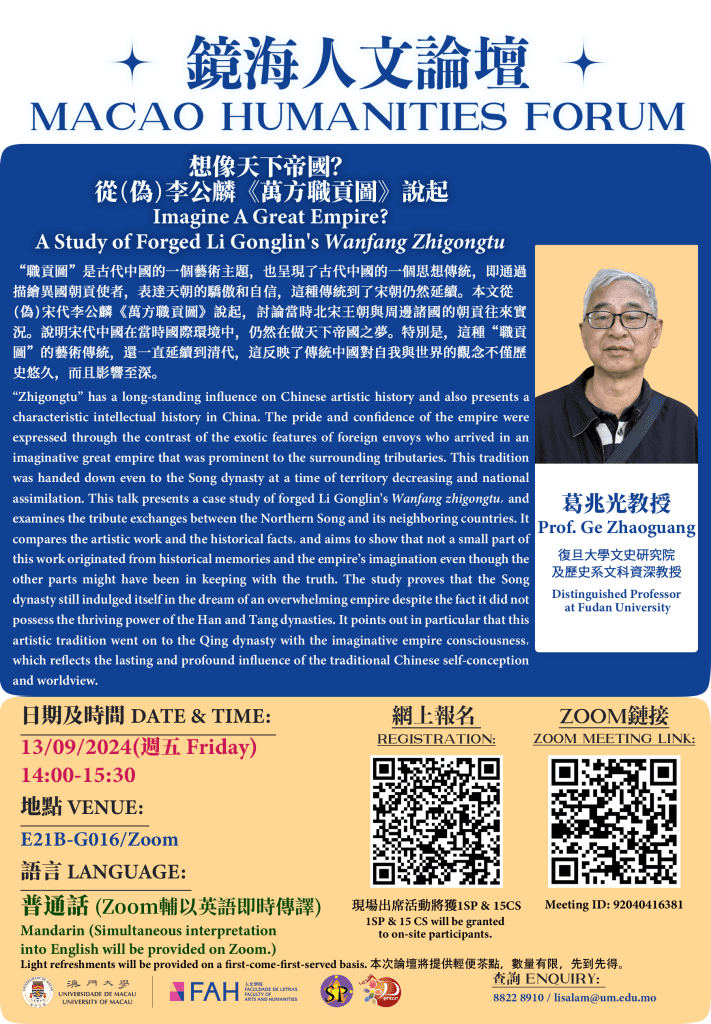【Macao Humanities Forum】Imagine A Great Empire? A Study of Forged Li Gonglin’s Wanfang Zhigongtu by Prof. Ge Zhaoguang from Fudan University (1 Smart Point and 15 CS)
【鏡海人文論壇】想像天下帝國?從(偽)李公麟《萬方職貢圖》說起 - 復旦大學 葛兆光教授 (1粒至叻星及15個CS)
現場出席活動的同學可獲一粒至叻星及全人發展獎勵計劃“知識整合能力”項的15個CS
On-site Participating Students will be awarded 1 SAO Smart Point and 15 CS on“Knowledge integration” in the Whole Person Development Award Programme
鏡海人文論壇(2024/2025)第一講將於2024年9月13日舉行。論壇定期邀請來自不同人文領域的世界知名學者,與學院師生分享其研究成果。 我們誠摯邀請澳大師生參加本次精彩的論壇。
本次鏡海人文論壇,人文學院榮幸地邀請到葛兆光教授 (Prof. Ge Zhaoguang) 擔任演講嘉賓,演講主題為「想像天下帝國?從(偽)李公麟《萬方職貢圖》說起」。葛兆光教授是復旦大學文史研究院及歷史系文科資深教授,復旦大學文史研究院創院院長,曾任清華大學教授。葛教授本科及碩士畢業於北京大學,並獲得香港教育大學人文榮譽博士學位,於2009年被美國普林斯頓大學選為第一屆「普林斯頓全球學人」。葛教授曾獲第26屆日本”亞洲·太平洋獎”大獎、第三屆韓國”坡州圖書獎”、第八屆”香港書獎”等獎項。主要著作包括《中國禪思想史——從6世紀到9世紀》(北京大學出版社,1995)、《中國思想史》兩卷本(復旦大學出版社,1998、2001)、《宅茲中國——重建有關「中國」的歷史論述》(中華書局,2011)等。
論壇詳情如下:
主講者:葛兆光教授 (Prof. Ge Zhaoguang)
主題:想像天下帝國?從(偽)李公麟《萬方職貢圖》說起
日期:2024年9月13日(星期五)
時間:14:00 – 15:30*
地點: E21B-G016/ 線上ZOOM
語言:普通話(ZOOM輔以英語即時傳譯)
*本次論壇將提供輕便茶點,數量有限,先到先得。
摘要:
“職貢圖”是古代中國的一個藝術主題,也呈現了古代中國的一個思想傳統,即通過描繪異國朝貢使者,表達天朝的驕傲和自信,這種傳統到了宋朝仍然延續。本文從(偽)宋代李公麟《萬方職貢圖》說起,討論當時北宋王朝與周邊諸國的朝貢往來實況。說明宋代中國在當時國際環境中,仍然在做天下帝國之夢。特別是,這種“職貢圖”的藝術傳統,還一直延續到清代,這反映了傳統中國對自我與世界的觀念不僅歷史悠久,而且影響至深。
歡迎有興趣參與的同事及同學於2024年9月11日(星期三)或之前透過https://umac.au1.qualtrics.com/jfe/form/SV_07ArIzblwO31WWa 報名。
We are very pleased to announce that the 1st Lecture of the FAH Macao Humanities Forum (2024/2025) will be held on 13 September 2024. The forum aims to provide a platform for world-renowned scholars from diverse humanities fields to share their research with the FAH community and other UM scholars. All members of the UM community are cordially invited to this splendid event.
In this upcoming forum, we are honored to have Prof. Ge Zhaoguang as our guest speaker to deliver a lecture on the topic “Imagine A Great Empire? A Study of Forged Li Gonglin’s Wanfang Zhigongtu”. Prof. Ge is a Distinguished Professor and the Founding Director of National Institute for Advanced Humanistic Studies at Fudan University. A graduate from Peking University and formerly a Professor at Tsinghua University, Prof. Ge was awarded an Honorary Doctorate in Humanities by the Hong Kong Education University, and recognised by Princeton University as the “Princeton Global Scholar” in 2009. Prof. Ge‘s accolades include: the winner of the “Asia-Pacific Award” in Japan and “Paju Book Award” in South Korea and Hong Kong Book Award, among others. His influential publications include: A History of Chinese Zen Buddhist Thought: From the 6th to 9th Century (Peking University Press, 1995), An Intellectual History of China (Volumes 1-2) (Fudan University Press, 1998, 2001), and Here in China: Reconstructing the Historical Narratives about “China” (Chung Hwa Book Company, 2011).
Details of the forum are as follows:
Speaker: Prof. Ge Zhaoguang葛兆光教授
Topic: Imagine A Great Empire? A Study of Forged Li Gonglin’s Wanfang Zhigongtu 想像天下帝國?從(偽)李公麟《萬方職貢圖》說起
Date: 13 Sept 2024 (Fri)
Time: 14:00 – 15:30*
Venue: On-Site (E21B-G016) / ZOOM
Language: Mandarin (Simultaneous interpretation into English will be provided on Zoom)
*Light refreshments will be provided on a first-come-first-served basis
Abstract:
“Zhigongtu” has a long-standing influence on Chinese artistic history and also presents a characteristic intellectual history in China. The pride and confidence of the empire were expressed through the contrast of the exotic features of foreign envoys who arrived in an imaginative great empire that was prominent to the surrounding tributaries. This tradition was handed down even to the Song dynasty at a time of territory decreasing and national assimilation. This talk presents a case study of forged Li Gonglin’s Wanfang zhigongtu, and examines the tribute exchanges between the Northern Song and its neighboring countries. It compares the artistic work and the historical facts, and aims to show that not a small part of this work originated from historical memories and the empire’s imagination even though the other parts might have been in keeping with the truth. The study proves that the Song dynasty still indulged itself in the dream of an overwhelming empire despite the fact it did not possess the thriving power of the Han and Tang dynasties. It points out in particular that this artistic tradition went on to the Qing dynasty with the imaginative empire consciousness, which reflects the lasting and profound influence of the traditional Chinese self-conception and worldview.
Please register for the forum by 11 Sept 2024 (Wed) via https://umac.au1.qualtrics.com/jfe/form/SV_07ArIzblwO31WWa

